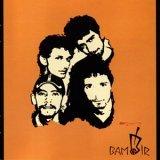BBR- Bambir (Gor Music)

** 1/2(Two and One Half Stars)
OK, let’s get a few things straight before we begin. First, the name of this band is officially BBR. Their album is called Bambir.
BBR is also referred to as Bambir, Bambir 2, or Bambir Kids.
There is another band called Bambir based in Gyumri, Armenia that was formed in 1978. They are the original Bambir and they still perform. Here is their original Quake album. They are now referred to as Bambir The Elders or the Original Bambir. Some of their kids formed a band called BBR, whose record we are reviewing today. On rare occasions BBR and Bambir perform together and call themselves, Bambir.
Got it? Good. Let’s move on, shall we?
BBR is the debut album from the Yerevan/Gyumri based rock band that is currently fast becoming a rock/alt music fan favorite in Armenia. In 2003, they were voted Armenia’s “Best Rock Band”, and in 2005, this very album under review was awarded the Armenian Music Award’s “Best Alternative Folk” honor edging out the owner of their record label, Gor Mkhitarian and his “Episode” CD. Are you still with me?
OK, let’s get down to the music. This CD is the reincarnation of a classic rock era Jethro Tull album. Straight forward rock and roll, a heavy reliance on the flute, and quirky moments here and there. The majority of songs are sung in Armenian with a few attempts at English thrown in for good measure. Let’s start with the obvious; BBR has a distinct style of their own with echoes of their parents Bambir Elder. The flute playing is outstanding with Arik’s fluid and frantic tone. The Ian Anderson connection is unmistakable. Lead singers Arman and Narek sound very similar in approach and style to Jag, the Elder Bambir leader. The song J.B.K. is a mix of Jethro Tull’s “Aqualung”, a J.S. Bach piece and a folk song from Komitas all rolled into one. Flutist Arik is again outstanding in tying together three different genres and making the piece flow like water. However, the band shows off its enormous potential in songs such as “Jan Gyulum” with its shvi intro and rollicking rock entry. “Hazaran Blboul” showcases BBR at its best with a collage of instruments and a catchy hook of a melody. “Nursery Rhymes” is flat out hysterical and strangely appealing with it’s child-like rhyme and brief Bambir Quake borrowed theme from their parents. “ The Castle” gives the listener a glimpse of where the band may be headed for in the future with its mature and polished sound. Again, a dead ringer for Bambir the Elder. The songs in English are nice attempts at blending their rock sensibility with the obvious mother tongue of the genre itself. However, they just can’t make it sound convincing.
So, why the average rating? A couple reasons. First, this is no ordinary album. BBR shows enough originality on Bambir to whet the appetite of critics and fans alike. Ultimately, devoting time to the sub par English songs on their first full album and the reliance on emulating the Jethro Tull and Elder Bambir sound so faithfully detracts from developing an original sound. While these collage of sounds and styles may very well work live, which is the current buzz in Yerevan these days, it just does not come through on record. If BBR wants to elevate their game and enter into the ranks of the world music global stage, get rid of the English stuff on record, continue to develop the Armenian material, and keep playing up the wacky strengths. From a reviewer who has been to many a world music festivals, including WOMEX, bad English accents are a quick turnoff and the native tongue is appreciated more.
So, I am in the rare position to recommend an album that I otherwise would not based on potential. Like so many debut albums, you sense you are on to something that just may flourish given some time and experience. BBR Bambir is a very unique listening experience in observing a band struggle to find their true identity. It is that very struggle that makes this one of the most odd and appealing albums I've heard in a while.

2 Comments:
I like that cover. Very retro. :P. Thanks.
JBK is not taken from Jethro Tull's "Aqualung", it is sampled from "Bourree" which is of course originally by Bach.
Just thought you'd like to know so you can pass on correct information as a music reviewer.
Post a Comment
<< Home